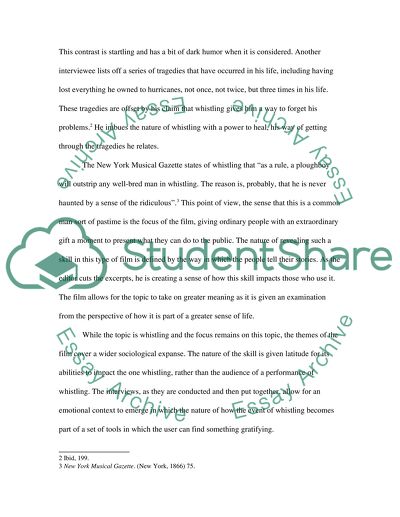Cite this document
(“Briefly outline documentary modes) Which specific mode of documentary Essay”, n.d.)
Briefly outline documentary modes) Which specific mode of documentary Essay. Retrieved from https://studentshare.org/visual-arts-film-studies/1577533-briefly-outline-documentary-modes-which-specific-mode-of-documentary-might-best-be-applied-to-understanding-pucker-up-the-fine-art-of-whistling-support-your-classification-of-this-documentary-with-research-and-close-analysis
Briefly outline documentary modes) Which specific mode of documentary Essay. Retrieved from https://studentshare.org/visual-arts-film-studies/1577533-briefly-outline-documentary-modes-which-specific-mode-of-documentary-might-best-be-applied-to-understanding-pucker-up-the-fine-art-of-whistling-support-your-classification-of-this-documentary-with-research-and-close-analysis
(Briefly Outline Documentary Modes) Which Specific Mode of Documentary Essay)
Briefly Outline Documentary Modes) Which Specific Mode of Documentary Essay. https://studentshare.org/visual-arts-film-studies/1577533-briefly-outline-documentary-modes-which-specific-mode-of-documentary-might-best-be-applied-to-understanding-pucker-up-the-fine-art-of-whistling-support-your-classification-of-this-documentary-with-research-and-close-analysis.
Briefly Outline Documentary Modes) Which Specific Mode of Documentary Essay. https://studentshare.org/visual-arts-film-studies/1577533-briefly-outline-documentary-modes-which-specific-mode-of-documentary-might-best-be-applied-to-understanding-pucker-up-the-fine-art-of-whistling-support-your-classification-of-this-documentary-with-research-and-close-analysis.
“Briefly Outline Documentary Modes) Which Specific Mode of Documentary Essay”, n.d. https://studentshare.org/visual-arts-film-studies/1577533-briefly-outline-documentary-modes-which-specific-mode-of-documentary-might-best-be-applied-to-understanding-pucker-up-the-fine-art-of-whistling-support-your-classification-of-this-documentary-with-research-and-close-analysis.


